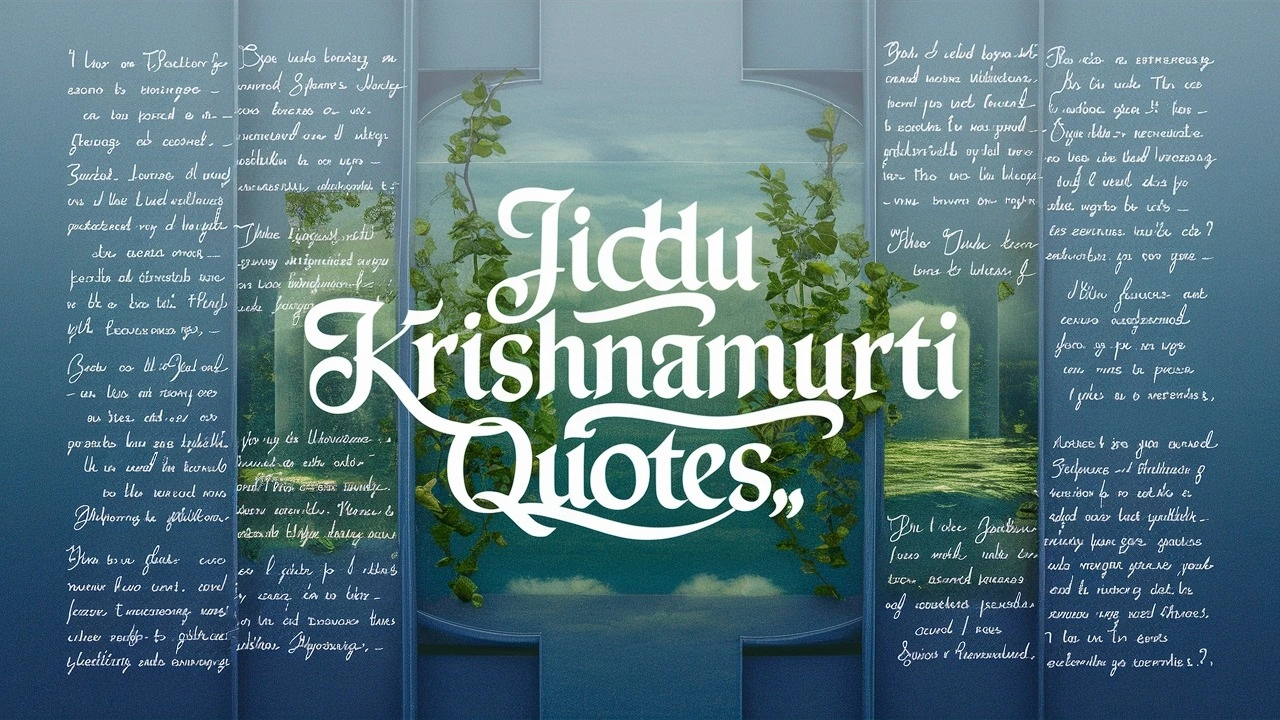The Jiddu Krishnamurti Quotes emphasize the importance of self-awareness, inner freedom, and the pursuit of truth.
In this blog post, we have compiled some of his most thought-provoking Jiddu Krishnamurti Quotes, categorized under various themes, to provide you with a deeper understanding of his philosophy.
Jiddu Krishnamurti, a renowned Indian philosopher, speaker, and writer, has inspired countless individuals with his profound insights on life, education, meditation, and human consciousness.
Truth and Self-Discovery
“Truth is a pathless land.”
Author: Jiddu Krishnamurti
Description:
Emphasizes that truth cannot be found through any organized religion or path but must be discovered individually.
“The ability to observe without evaluating is the highest form of intelligence.”
Author: Jiddu Krishnamurti
Description:
Highlights the importance of observing life without judgment to gain true understanding.
“To understand yourself is the beginning of wisdom.”
Author: Jiddu Krishnamurti
Description:
Stresses the significance of self-awareness as the foundation of wisdom.
“Freedom from the desire for an answer is essential to the understanding of a problem.”
Author: Jiddu Krishnamurti
Description:
Suggests that letting go of the need for answers can lead to a deeper understanding of issues.
“You must understand the whole of life, not just one little part of it.”
Author: Jiddu Krishnamurti
Description:
Encourages a holistic approach to understanding life.
“The moment you have in your heart this extraordinary thing called love and feel the depth, the delight, the ecstasy of it, you will discover that for you the world is transformed.”
Author: Jiddu Krishnamurti
Description:
Describes how love can transform one’s perception of the world.
“It is no measure of health to be well adjusted to a profoundly sick society.”
Author: Jiddu Krishnamurti
Description:
Critiques of conformity to a dysfunctional society as not indicative of true well-being.
“The primary cause of disorder in ourselves is the seeking of reality promised by another.”
Author: Jiddu Krishnamurti
Description:
Warns against relying on others for understanding reality, advocating for personal discovery.
“The constant assertion of belief is an indication of fear.”
Author: Jiddu Krishnamurti
Description:
Suggests that rigid beliefs often stem from fear and insecurity.
“To be is to be related.”
Author: Jiddu Krishnamurti
Description:
Highlights the interconnected nature of existence and relationships.
Education and Learning
“The function of education is to help you from childhood not to imitate anybody, but to be yourself all the time.”
Author: Jiddu Krishnamurti
Description:
Advocates for an education system that fosters individuality and self-expression.
“Learning is movement from moment to moment.”
Author: Jiddu Krishnamurti
Description:
Describes learning as a continuous, dynamic process.
“Education is not the filling of a pail, but the lighting of a fire.”
Author: Jiddu Krishnamurti
Description:
Suggests that true education should inspire and ignite passion in learners.
“In the light of calm and steady self-awareness, inner energies wake up and work miracles without any effort on your part.”
Author: Jiddu Krishnamurti
Description:
Emphasizes the power of self-awareness in awakening one’s potential.
“The highest function of education is to bring about an integrated individual who is capable of dealing with life as a whole.”
Author: Jiddu Krishnamurti
Description:
Highlights the goal of education as developing well-rounded individuals.
“Intelligence is the capacity to perceive the essential, the what is, and to awaken this capacity, in oneself and others, is education.”
Author: Jiddu Krishnamurti
Description:
Defines intelligence as the ability to perceive reality and emphasizes the role of education in awakening this ability.
“A consistent thinker is a thoughtless person because he conforms to a pattern; he repeats phrases and thinks in a groove.”
Author: Jiddu Krishnamurti
Description:
Critiques rigid thinking and advocates for flexibility and originality.
“Education aims to cultivate a deep, profound intelligence.”
Author: Jiddu Krishnamurti
Description:
Focuses on developing deep intelligence rather than superficial knowledge.
“True education is to learn how to think, not what to think.”
Author: Jiddu Krishnamurti
Description:
Emphasizes teaching students to think critically and independently.
“When you learn about yourself, watch yourself, watch the way you walk, how you eat, what you say, the gossip, the hate, the jealousy—if you are aware of all that in yourself, without any choice, that is part of education.”
Author: Jiddu Krishnamurti
Description:
Describes self-awareness as an essential component of true education.
Meditation and Mindfulness
“Meditation is not a means to an end. It is both the means and the end.”
Author: Jiddu Krishnamurti
Description:
Views meditation as a practice that is valuable in itself, not just a tool for achieving other goals.
“To meditate means to observe.”
Author: Jiddu Krishnamurti
Description:
Simplifies meditation to the act of pure observation without interference.
“Meditation is to be aware of every thought and of every feeling, never to say it is right or wrong but just to watch it and move with it.”
Author: Jiddu Krishnamurti
Description:
Defines meditation as a non-judgmental awareness of thoughts and feelings.
“A mind that is full of conclusions is a dead mind.”
Author: Jiddu Krishnamurti
Description:
Warns against a closed mind and emphasizes openness in meditation.
“In the space which thought creates around itself, there is no love. This space divides man from man.”
Author: Jiddu Krishnamurti
Description:
Discusses how thought can create division, hindering true connection and love.
“Meditation is the emptying of the mind of all the thoughts of the self.”
Author: Jiddu Krishnamurti
Description:
Describes meditation as the process of clearing the mind of ego-centric thoughts.
“Freedom from the known is death, and then you are living.”
Author: Jiddu Krishnamurti
Description:
Suggests that true freedom and life come from letting go of preconceived notions and the known.
“Meditation is to be aware of your thoughts and your feelings, to understand them and not to resist them.”
Author: Jiddu Krishnamurti
Description:
Encourages understanding and acceptance of thoughts and feelings in meditation.
“Meditation is a state of mind which looks at everything with complete attention, totally, not just parts of it.”
Author: Jiddu Krishnamurti
Description:
Defines meditation as a state of complete and undivided attention.
“Only in silence, when the mind is not seeking, not expecting, not wanting, can there be understanding.”
Author: Jiddu Krishnamurti
Description:
Highlights the importance of a quiet and still mind for true understanding.
Freedom and Liberation
“Freedom is not the absence of commitments, but the ability to choose and commit to what is best for you.”
Author: Jiddu Krishnamurti
Description:
Redefines freedom as the power of choice and commitment.
“The moment you follow someone, you cease to follow Truth.”
Author: Jiddu Krishnamurti
Description:
Warns against following others blindly and emphasizes the pursuit of personal truth.
“Freedom from the desire for an answer is essential to the understanding of a problem.”
Author: Jiddu Krishnamurti
Description:
Suggests that true understanding comes from letting go of the need for definitive answers.
“The primary cause of disorder in ourselves is the seeking of reality promised by another.”
Author: Jiddu Krishnamurti
Description:
Critiques the reliance on external sources for understanding reality.
“To be free from the known is to enter into the unknown.”
Author: Jiddu Krishnamurti
Description:
Encourages letting go of past knowledge and experiences to embrace new possibilities.
“Freedom is to stand alone, unattached and unafraid, free in the understanding of desire which breeds illusion.”
Author: Jiddu Krishnamurti
Description:
Defines freedom as detachment from desires and illusions.
“It is the truth that liberates, not your effort to be free.”
Author: Jiddu Krishnamurti
Description:
Emphasizes that liberation comes from understanding truth, not merely striving for freedom.
“Freedom is to be a light unto oneself; it is to be independent of the good opinion of others.”
Author: Jiddu Krishnamurti
Description:
Advocates for self-reliance and independence from external validation.
“There is no end to education. It is not that you read a book, pass an examination, and finish with education. The whole of life, from the moment you are born to the moment you die, is a process of learning.”
Author: Jiddu Krishnamurti
Description:
Views education as a lifelong process of learning and growth.
“It is only when the mind is free from the old that it meets everything anew, in an innocent, fresh way.”
Author: Jiddu Krishnamurti
Description:
Suggests that mental freedom allows for a fresh and innocent perspective on life.
Love and Relationships
“Love is not a reaction. If I love you because you love me, that is mere trade, a thing to be bought in the market; it is not love.”
Author: Jiddu Krishnamurti
Description:
Defines love as unconditional and not based on reciprocity.
“Love is the most difficult discipline.”
Author: Jiddu Krishnamurti
Description:
Describes love as a challenging yet essential practice.
“Love is that state of mind which has no division.”
Author: Jiddu Krishnamurti
Description:
Views love as a unifying and undivided state of mind.
“In the space which thought creates around itself, there is no love. This space divides man from man.”
Author: Jiddu Krishnamurti
Description:
Discusses how thought can create division, hindering true connection and love.
“Only when the mind is still, love will flow.”
Author: Jiddu Krishnamurti
Description:
Suggests that a quiet mind is essential for the flow of love.
“Love is not to be found in another person but in our own heart.”
Author: Jiddu Krishnamurti
Description:
Emphasizes that love originates within oneself.
“Where there is love, there is no fear. And without fear, there is freedom.”
Author: Jiddu Krishnamurti
Description:
Connects love with the absence of fear and the presence of freedom.
“Love is new, fresh, alive. It has no yesterday and no tomorrow. It is beyond the turmoil of thought.”
Author: Jiddu Krishnamurti
Description:
Describes love as timeless and beyond thought.
“Love is not possessiveness.”
Author: Jiddu Krishnamurti
Description:
Defines love as free from the desire to possess.
“When there is love, there is clarity.”
Author: Jiddu Krishnamurti
Description:
Suggests that love brings clarity to life and relationships.
Fear and Courage
“Do not seek after what you yearn for; seek the source of the yearning itself.”
Author: Jiddu Krishnamurti
Description:
Advises looking into the root cause of desires rather than pursuing them.
“Fear is not of the unknown but of losing the known.”
Author: Jiddu Krishnamurti
Description:
Explains that fear often comes from the possibility of losing familiar things.
“The moment you are afraid of something, you give it power over you.”
Author: Jiddu Krishnamurti
Description:
Highlights how fear can empower the very thing we fear.
“Understanding the whole of life is understanding the whole of fear.”
Author: Jiddu Krishnamurti
Description:
Connects the understanding of life with the understanding of fear.
“One is never afraid of the unknown; one is afraid of the known coming to an end.”
Author: Jiddu Krishnamurti
Description:
Suggests that fear is tied to the end of familiar experiences.
“To be free of fear is to be aware of it without the interference of any escape.”
Author: Jiddu Krishnamurti
Description:
Encourages facing fear directly without seeking escape.
“The ending of fear is the beginning of wisdom.”
Author: Jiddu Krishnamurti
Description:
Views the overcoming of fear as the start of true wisdom.
“When you understand fear, you are free of it.”
Author: Jiddu Krishnamurti
Description:
Suggests that understanding fear leads to liberation from it.
“Fear exists when there is no understanding of oneself.”
Author: Jiddu Krishnamurti
Description:
Links fear to a lack of self-understanding.
“Courage is not the absence of fear, but the perception that some things are more important than fear.”
Author: Jiddu Krishnamurti
Description:
Defines courage as recognizing what is more important than fear.
Change and Transformation
“To transform the world, we must begin with ourselves.”
Author: Jiddu Krishnamurti
Description:
Emphasizes that personal change is the first step to transforming the world.
“It is not a measure of health to be well adjusted to a profoundly sick society.”
Author: Jiddu Krishnamurti
Description:
Critiques the idea of adjusting to a flawed society as a sign of true health.
“You cannot change the world without changing yourself.”
Author: Jiddu Krishnamurti
Description:
Stresses the importance of self-transformation for broader change.
“To see what is true and to act upon it instantly means a complete change.”
Author: Jiddu Krishnamurti
Description:
Suggests that recognizing and acting on truth leads to immediate transformation.
“Without freedom from the past, there is no change.”
Author: Jiddu Krishnamurti
Description:
Highlights the necessity of letting go of the past to enable change.
“The ending of something is the beginning of something else.”
Author: Jiddu Krishnamurti
Description:
Describes endings as opportunities for new beginnings.
“Real revolution is not through violence, but through the understanding of oneself.”
Author: Jiddu Krishnamurti
Description:
Defines true revolution as a result of self-understanding rather than violence.
“Transformation occurs amid awareness.”
Author: Jiddu Krishnamurti
Description:
Links transformation to the state of being aware.
“Change is only possible in the present.”
Author: Jiddu Krishnamurti
Description:
Emphasizes the power of the present moment in facilitating change.
“True change is within; leave the outside as it is.”
Author: Jiddu Krishnamurti
Description:
Focuses on internal change as the basis for real transformation.
Mind and Thought
“The ability to observe without evaluating is the highest form of intelligence.”
Author: Jiddu Krishnamurti
Description:
Emphasizes the importance of observing without judgment to gain true understanding.
“Thought is so cunning, so clever, that it distorts everything for its convenience.”
Author: Jiddu Krishnamurti
Description:
Warns about the deceptive nature of thought.
“The very desire to be certain, to be secure, is the beginning of bondage.”
Author: Jiddu Krishnamurti
Description:
Suggests that the quest for certainty and security can lead to mental bondage.
“Thought is limited, but the mind that observes thought is not.”
Author: Jiddu Krishnamurti
Description:
Differentiates between limited thought and the expansive mind that can observe it.
“Thought is never new, because thought is the response of memory.”
Author: Jiddu Krishnamurti
Description:
Describes thought as a product of past experiences and memories.
“To understand the immeasurable, the mind must be extraordinarily quiet, still.”
Author: Jiddu Krishnamurti
Description:
Highlights the need for a quiet mind to comprehend the immeasurable aspects of life.
“Where there is love, there is no question or dilemma.”
Author: Jiddu Krishnamurti
Description:
Connects love with the resolution of inner conflicts.
“The mind is never quiet; it is always chattering.”
Author: Jiddu Krishnamurti
Description:
Describes the constant activity of the mind.
“The mind that is full of conclusions is a dead mind.”
Author: Jiddu Krishnamurti
Description:
Warns against a mind that is rigid and closed to new ideas.
“When you are completely attentive, you are listening.”
Author: Jiddu Krishnamurti
Description:
Defines true listening as complete attention without distraction.
Society and Humanity
“It is no measure of health to be well adjusted to a profoundly sick society.”
Author: Jiddu Krishnamurti
Description:
Critiques the idea of conforming to a dysfunctional society.
“Society is always trying to mold the individual.”
Author: Jiddu Krishnamurti
Description:
Discusses the pressures society exerts on individuals to conform.
“You are the world, and the world is you.”
Author: Jiddu Krishnamurti
Description:
Highlights the interconnectedness of individuals and the world.
“The crisis is in the mind, not out there.”
Author: Jiddu Krishnamurti
Suggests that many societal crises originate within the mind.
“The problem is not in the world, but in the mind that creates the world.”
Author: Jiddu Krishnamurti
Description:
Emphasizes the role of the mind in shaping our perception of the world.
“The individual is conditioned by society, but the individual is also the creator of society.”
Author: Jiddu Krishnamurti
Description:
Discusses the reciprocal relationship between individuals and society.
“Real change comes from within, not from external conditions.”
Author: Jiddu Krishnamurti
Description:
Emphasizes the importance of internal change for societal transformation.
“The more you know yourself, the more clarity there is. Self-knowledge has no end—you don’t come to an achievement; you don’t conclude. It is an endless river.”
Author: Jiddu Krishnamurti
Description:
Describes self-knowledge as a continuous, ever-evolving process.
“We have to understand the whole of life, not just one little part of it.”
Author: Jiddu Krishnamurti
Description:
Encourages a holistic understanding of life and existence.
“You must understand the whole of life, not just one little part of it. That is why you must read, that is why you must look at the skies, that is why you must sing, and dance, and write poems, and suffer, and understand, for all that is life.”
Author: Jiddu Krishnamurti
Description:
Encourages a broad, experiential understanding of life.
Nature and the Environment
“The earth is ours, not to be abused and destroyed, but to be respected and loved.”
Author: Jiddu Krishnamurti
Description:
Advocates for a respectful and loving relationship with the earth.
“If we could see the miracle of a single flower clearly, our whole life would change.”
Author: Jiddu Krishnamurti
Description:
Suggests that a deep appreciation of nature can transform our lives.
“We never look deeply into the quality of a tree; we never really feel the essence of a tree.”
Author: Jiddu Krishnamurti
Description:
Highlights the superficial way we often perceive nature.
“To observe nature, you must be quiet inside. The moment you are silent, you are in communion with nature.”
Author: Jiddu Krishnamurti
Description:
Emphasizes the need for inner silence to truly connect with nature.
“The earth is not just an environment to be preserved, but a living entity to be respected and revered.”
Author: Jiddu Krishnamurti
Description:
Views the earth as a living entity deserving respect and reverence.
“Nature has a way of creating balance, and we must learn from it.”
Author: Jiddu Krishnamurti
Description:
Encourages learning from nature’s inherent balance and harmony.
“We must find ways to live in harmony with nature, not exploit it.”
Author: Jiddu Krishnamurti
Description:
Advocates for sustainable and harmonious living with nature.
“A tree is not just an object; it is a living being with its own life.”
Author: Jiddu Krishnamurti
Description:
Recognizes the intrinsic value and life of trees beyond being mere objects.
“To see the beauty of nature is to see the beauty of life itself.”
Author: Jiddu Krishnamurti
Description:
Connects the appreciation of nature with the appreciation of life.
“The greatest respect for nature is to understand our place within it, not above it.”
Author: Jiddu Krishnamurti
Description:
Emphasizes understanding our role as part of nature, rather than its dominators.










